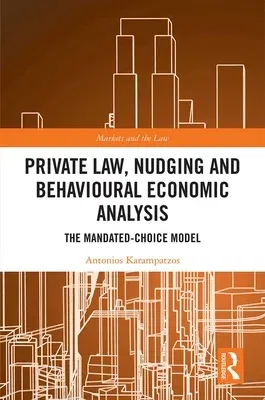Antonios Karampatzos
(Author)Private Law, Nudging and Behavioural Economic Analysis: The Mandated-Choice ModelHardcover, 17 January 2020

Qty
1
Turbo
Ships in 2 - 3 days
Only 1 left
Free Delivery
Cash on Delivery
15 Days
Free Returns
Secure Checkout

Part of Series
Markets and the Law
Print Length
174 pages
Language
English
Publisher
Routledge
Date Published
17 Jan 2020
ISBN-10
036741032X
ISBN-13
9780367410322
Description
Product Details
Author:
Book Format:
Hardcover
Country of Origin:
US
Date Published:
17 January 2020
Dimensions:
23.39 x
15.6 x
1.27 cm
ISBN-10:
036741032X
ISBN-13:
9780367410322
Language:
English
Location:
Oxford
Pages:
174
Publisher:
Series:
Weight:
444.52 gm